Suzuki Grand Vitara: Sunroof (if equipped)
You can tilt or slide the sunroof by operating the “TILT” part of the sunroof switch or the “SLIDE” part of the sunroof switch when the ignition switch is in the “ON” position. There is a system to prevent being pinched by the sunroof. When the system senses that something is pinched when the sunroof is sliding forward, the sunroof will automatically reverse direction and slide rearward. This system will operate when the sunroof is closing automatically. This system does not operate when tilting the sunroof down. Make sure there are no hands or other obstructions in the path of the sunroof when you close the sunroof even though there is a system to prevent being pinched by the sunroof.
 WARNING:
WARNING:
• The system to prevent being pinched by the sunroof does not work in the area where
the sunroof is almost completely closed.
• The system to prevent being pinched by the sunroof may not work if the battery
is not sufficiently charged.
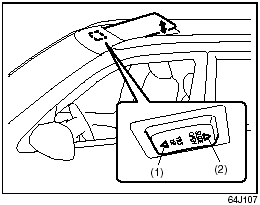
To tilt the sunroof up, slide the sun shade rearward by hand and push the “TILT UP” part (1) of the sunroof switch. To tilt the sunroof down, push the “SLIDE OPEN” part (2) of the sunroof switch. If you push the switch for more than a second, the sunroof will automatically tilt up or down fully. To stop the sunroof halfway, push the switch briefly.
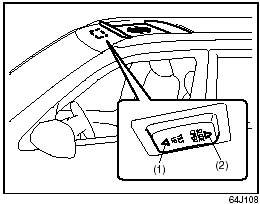
To slide the sunroof rearward, push the “SLIDE OPEN” part (2) of the sunroof switch. To side the sunroof forward, push the “TILT UP” part (1) of the sunroof switch. If you push the switch for more than a second, the sunroof will automatically slide fully rearward or forward. To stop the sunroof halfway, push the switch briefly.
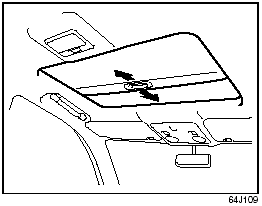
The sun shade will open automatically and cannot be closed when the sunroof is slid rearward.
How to reactivate the system to prevent being pinched by the sunroof
When you disconnect the negative (–) terminal from the battery or change the
fuses, the features below will not operate.
• The system to prevent being pinched by the sliding sunroof.
• The system to automatically open or close the sunroof fully.
In this case, you must reactivate the features using the following procedures. 1) Turn the ignition switch to the “ON” position. 2) Push and hold the “TILT UP” part (1) of the sunroof switch, the sunroof will tilt up fully and then down slightly. After the movement stops completely, release the switch. The features are reactivated. 3) Make sure you can open or close the sunroof automatically by pushing the sunroof switch for more than about a second.
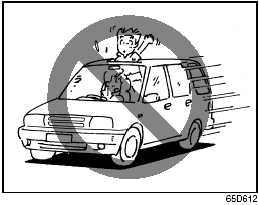
 WARNING:
WARNING:
• Never allow any part of your body such as hands or head to get out of the sunroof
opening while the vehicle is moving.
• Be sure there are no hands or other obstructions in the path of the sunroof when
you close the sunroof.
• Always remove the ignition key when leaving the vehicle even if for a short time.
Also do not leave children alone in a parked vehicle. Unattended children could
use the sunroof switches and get trapped by the sunroof.
CAUTION: Do not put your body weight on the roof around the sunroof such as by sitting on it.
• Be sure to close the sunroof when you leave the vehicle unattended.
• Periodically inspect the guide rail for dirt and clean it if any dirt has accumulated.
Engine Hood
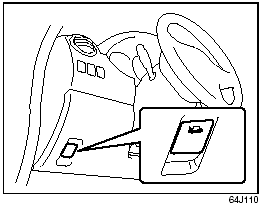
Engine Hood
To open the engine hood: 1) Pull the hood release handle located on the outboard side of the driver’s side of the instrument panel. This will disengage the engine hood lock halfway.
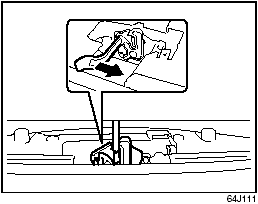
2) Push the under-hood release lever sideways with your finger, as shown in the illustration. While pushing the lever, lift up the engine hood.
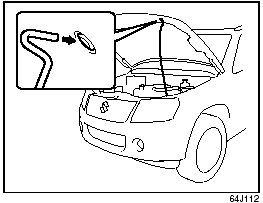
3) Continue to lift up the hood until it is high enough to support with the prop rod.
To close the engine hood: 1) Lift the hood up slightly and remove the prop rod from the hole. Put the prop rod back to the holding clip. 2) Lower the hood close to the bumper, then let it drop down. Make sure the hood is securely latched after closing.
 WARNING: Make sure the hood is
fully closed and latched before driving. If it is not, it can fly up unexpectedly
during driving, obstructing your view and resulting in an accident.
WARNING: Make sure the hood is
fully closed and latched before driving. If it is not, it can fly up unexpectedly
during driving, obstructing your view and resulting in an accident.
Cup Holder and Storage Bin (if equipped)
Cup holders and a storage bin are provided as shown.
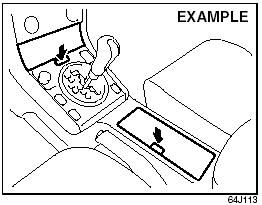
To access a bin, push the release button.
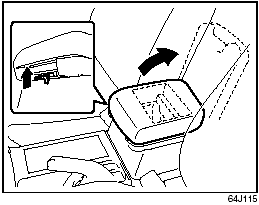
To use the console bin, pull the lever up and open the lid.
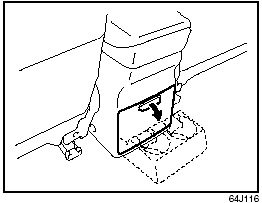
To use the rear cup holders, open the lid.
 WARNING: Do not use the cup holder
or the storage bin to hold cups containing hot liquids or sharp-edged, hard or breakable
objects. Objects in these bins may be thrown about during a sudden stop or impact,
and could cause personal injury.
WARNING: Do not use the cup holder
or the storage bin to hold cups containing hot liquids or sharp-edged, hard or breakable
objects. Objects in these bins may be thrown about during a sudden stop or impact,
and could cause personal injury.
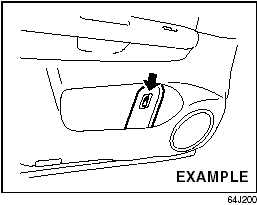
Bottle holder
You should hold a bottle with a cap in the bottle holder.
Overhead Console Box (if equipped)
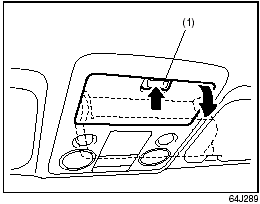
Overhead Console
Box (if equipped)
To use the overhead console box, push on the front edge (1) and open the lid. To close the lid, push the front edge (1) until it latches. Do not put heavy or sharp items in the box.
 WARNING: Never drive with the
overhead console box lid open. It could cause injury if an accident occurs.
WARNING: Never drive with the
overhead console box lid open. It could cause injury if an accident occurs.
CAUTION: If you park your vehicle outdoors in direct sunlight or in hot weather,
the eyeglasses compartment can get very hot since it is close to the roof. So, when
parking in such conditions:
• Do not leave eyeglasses in the compartment. The heat may distort plastic lenses
or frames.
• Do not place flammable items, such as a lighter, in the compartment. The heat
may cause a fire.
NOTE: An aftermarket garage door opener can be installed in the front side overhead console box.
Accessory Socket (if equipped)
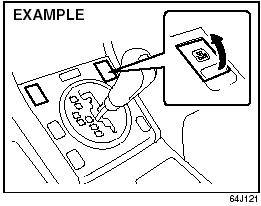
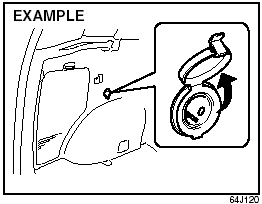
12-volt accessory sockets are located both on the center console and on the left side of the luggage compartment. Depending on the specification, there are two sockets on the center console. Each socket can be used to provide 12 volt/120 watt power for electrical accessories when used alone. Make sure that the cap remains on the socket when the socket is not in use.
CAUTION:
• To prevent the fuse from being blown, when using sockets at the same time, do
not exceed the total combined power capacity of 120 watts.
• Use of inappropriate electrical accessories can cause damage to your vehicle’s
electrical system. Make sure that any electrical accessories you use are designed
to plug into this type of socket.
Cigarette Lighter and Ashtray
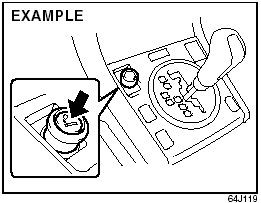
Cigarette Lighter
(if equipped)
To use the cigarette lighter, push it all the way into the receptacle and release it. It will automatically heat up and will pop out to its normal position when it is ready for use.
CAUTION:
• Holding the cigarette lighter in can overheat and damage the lighter. Release
the lighter after you push it in.
• To avoid damage to the cigarette lighter socket, do not use it as an accessory
power source. Some accessories’ power plug can damage the inner mechanism of the
cigarette lighter socket.
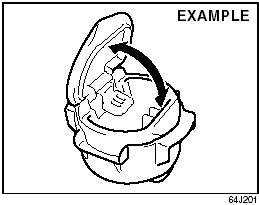
Ashtray (if equipped)
You can fit the ashtray into any of the cup holders on the center console.
 WARNING: Make sure tobacco is
fully extinguished before closing the ashtrays. Never throw waste in the ashtrays:
it could create a fire hazard.
WARNING: Make sure tobacco is
fully extinguished before closing the ashtrays. Never throw waste in the ashtrays:
it could create a fire hazard.
Frame Hooks
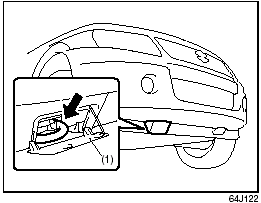
Front
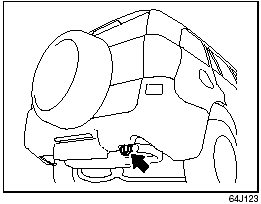
Rear
Frame hooks are provided at the front and rear of the vehicle. To access the front hook, unhook the lower part of the cover (1) and then remove the cover (1).
 WARNING: Do not use the frame
hooks to tow another vehicle or to have your vehicle towed on the road or highway.
The hooks are designed for use in emergency situations only, such as if your vehicle
or another vehicle gets stuck in deep mud or snow.
WARNING: Do not use the frame
hooks to tow another vehicle or to have your vehicle towed on the road or highway.
The hooks are designed for use in emergency situations only, such as if your vehicle
or another vehicle gets stuck in deep mud or snow.
Tire Changing Tool
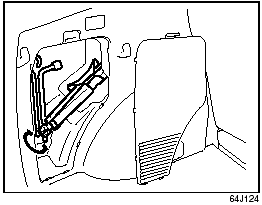
Tire Changing
Tool
The jack, wheel brace and jack handle are stowed in the rear left corner of the luggage compartment. Remove the cover to access the tools. To remove the jack, turn its shaft counterclockwise and pull the jack out of the storage bracket. To stow the jack, place it in the storage bracket and turn the shaft clockwise until the jack is securely held in place.
 WARNING: The jack should be used
only to change wheels. It is important to read the jacking instructions in the “EMERGENCY
SERVICE” section of this manual before attempting to use the jack.
WARNING: The jack should be used
only to change wheels. It is important to read the jacking instructions in the “EMERGENCY
SERVICE” section of this manual before attempting to use the jack.
 WARNING: After using the jack,
extension rod and lug wrench, be sure to stow them securely, or they could be thrown
about in an accident, causing injury.
WARNING: After using the jack,
extension rod and lug wrench, be sure to stow them securely, or they could be thrown
about in an accident, causing injury.
Shopping Hook (if equipped)
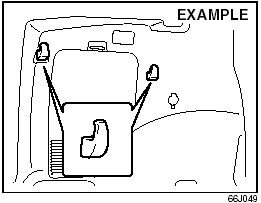
Shopping Hook
(if equipped)
The shopping hooks are located on both sides of the luggage compartment. You can hang the shopping bag or other suitable objects on the hook. This hook is not designed for large or heavy items.
Front Seat Back Pocket (if equipped)
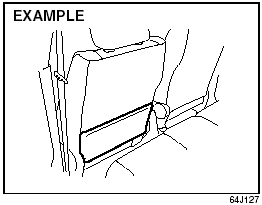
Front Seat Back
Pocket (if equipped)
This pocket is provided for holding light and soft things such as gloves, newspapers or magazines.
 WARNING: Do not put hard or breakable
objects in the pocket. If an accident occurs, objects such as bottles, cans, etc.
can injure the occupants in the rear seat.
WARNING: Do not put hard or breakable
objects in the pocket. If an accident occurs, objects such as bottles, cans, etc.
can injure the occupants in the rear seat.
Luggage Restraint Loops (if equipped)
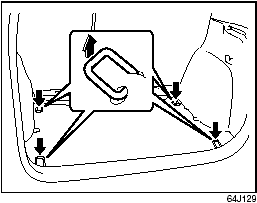
Luggage Restraint
Loops (if equipped)
Four luggage restraint loops are provided on the luggage compartment floor. An optional rubber net can be hooked to these loops to help keep cargo from moving around in the luggage compartment during normal driving.
 WARNING: The luggage restraint
loops and optional rubber net can be used to help keep lightweight cargo from moving
around in the luggage compartment during normal driving. They are neither capable
of nor intended for preventing cargo from being thrown around in a crash. Place
heavier objects on the floor and as far forward in the cargo area as possible. Never
pile cargo higher than the top of the seat backs.
WARNING: The luggage restraint
loops and optional rubber net can be used to help keep lightweight cargo from moving
around in the luggage compartment during normal driving. They are neither capable
of nor intended for preventing cargo from being thrown around in a crash. Place
heavier objects on the floor and as far forward in the cargo area as possible. Never
pile cargo higher than the top of the seat backs.
 WARNING: Do not attach the child
restraint top strap to the luggage restraint loops. Incorrectly attached top strap
will reduce the intended effectiveness of the child restraint system.
WARNING: Do not attach the child
restraint top strap to the luggage restraint loops. Incorrectly attached top strap
will reduce the intended effectiveness of the child restraint system.
See also:
To help prevent corrosion
You can help prevent corrosion from getting
started by observing the following:
Keep Your Car Clean
The best way to prevent corrosion is to keep
your car clean and free of corrosive materials.
Attention to the underside of the car is particul ...
Interior lights
Do not use for extended periods of time
with the engine stopped. This could
result in a discharged battery. ...

 Folding Seats
Folding Seats